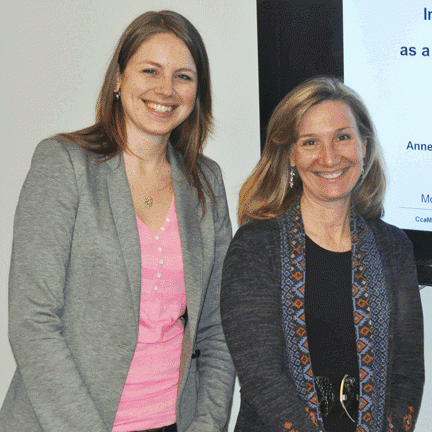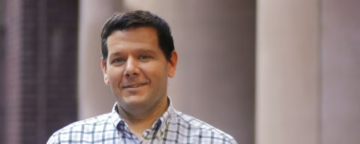Ph.D. candidate Karin Fikkers, from the University of Amsterdam, has been studying at the Annenberg School for Communication for two months as part of an exchange program with the Amsterdam School of Communication Research. The program opens each school to visiting students and faculty from the other to facilitate an international, intercultural research exchange. Fikkers, who arrived in January, is working on doctoral research on media effects, violence, and children under the mentorship of Annenberg Public Policy Center associate director Amy Jordan, who leads research on youth and media at the center.
What brought you to the Annenberg School and the Annenberg Public Policy Center?
Well, in Amsterdam, there’s funding available for Ph.D. students to go to a different university for a couple of months, so I had the opportunity, and my advisor at the University of Amsterdam is Jessica Taylor Piotrowski, who worked and was a student at Annenberg. What I’m hoping to do is get a better view of media effects research, to talk to other researchers who are in my field and outside my field. I’m taking a course in public health communication and trying to attend as many colloquia and presentations as I can to get a sense of what academic life means in the States.

Karin Fikkers and Amy Jordan.
How did you become interested in communication?
Both my bachelor’s and master’s program were in communication, so I had decided early on that I wanted to be a communication scholar.
As an undergraduate you studied business communication; how did you end up studying media effects and violence?
Business communication is more persuasive communication. When I was finishing my masters’, I was looking for jobs as a Ph.D. in the Netherlands. There you apply for a job on a research project, and the project I found was on how different children react to different media in different ways. One of the subprojects was on media violence and aggression, which just seemed very interesting to me. I didn’t have a background yet in media violence and aggression, and I learned it all on the job.
Was it difficult to transition to a new area of study?
In the Netherlands, it’s nice if you have a background in your research topic, but it’s not required. Media violence is a crazy field, because they’ve been studying it since the 1950s. When I started, I was like, “Everything has been done! I cannot add anything!” but then I’ve discovered that there are a lot of research questions that we haven’t answered yet.
Your work is part of a large-scale project called “The Entertainization of Childhood”; what is it about and what is your role?
It’s a big project that’s funded by the European Research Council. My advisor, Patti Valkenburg, got a grant of 2.5 million Euro [$3.4 million] and we work with about five or six researchers on a team. The goal is to find out which children are most susceptible to particular types of media. My particular focus is media violence, but we also have prosocial media, and we have social media, and other effects such as ADHD and cognitive development.
Do you often work with the other researchers involved in the project?
There was a lot of collaboration in the beginning, the first two years, when we were working to set up the survey and the study. Now that we’re collecting data we’re working more on our individual projects, so everyone will get out the variables they put into the questionnaire.
And what are you working on right now?
I’m working on a paper that will go into my dissertation. In the Netherlands a dissertation is made up of five papers rather than one large or extensive discussion of one study. I’m working on a paper that is looking at the role of peers in the relationship between media violence and aggression. So, if you have aggressive peers around you, does media violence have a stronger effect on aggression than if you have non-aggressive peers in your environment? That’s the overall focus of my dissertation: How can the social environment of a child change the effects of media violence on aggression?
How does your current research relate to your last paper, “How Family Conflict Moderates the Relationship between Media Violence and Adolescents’ Aggression”?
It’s a continuation in the sense that I’m trying to do different studies with different social factors. Family conflict was one social factor that I studied, and now I do peer norms: What do your peers think of aggression and how do they behave in terms of aggression? At the end, I will try to tie the whole thing together and come to a broader conclusion. My separate studies are like little steps toward the answer to the question, which adolescents are most vulnerable to media violence?
How does working at Penn compare with University of Amsterdam?
What I’m doing here is quite similar, because I’m working on my own research, which is what I do in the Netherlands. If I were a Ph.D. student here, that would be quite different, because Ph.D.’s take much more coursework, whereas in the Netherlands maybe you take one or two statistics courses, but other than that you mainly work on research. Considering that, it’s quite similar, because the work that I do in Amsterdam I’m now doing here, except that I’m also exchanging ideas with other people outside my research team.
What is the course of study like in the Netherlands?
A bachelor’s is three years, and then a master’s is one or two years. It’s common to do it in one go. It’s very uncommon in the Netherlands to get only your bachelor’s at the university, so people will study for four or five years and get their master’s as well. And it’s also quite common if you want to get your Ph.D. to try to do it immediately after your master’s. I think here it’s more common to wait for a bit and see what you want to do with your life and go back to school and get your master’s and your Ph.D.
Do you have any advice for graduate students or students considering graduate school?
Do it! I really like doing research and being a grad student. I think communication research is a super-interesting topic that almost everyone who is not a researcher will agree is important – if you explain to people, I’m doing research on media violence, or on health campaigns, everyone will understand why it matters. I think it’s a dynamic field, because there are a lot of other things that can determine if communication has an effect on people. And communication researchers are really nice people! I would advise anyone to go for a Ph.D., because it’s a great time when you can learn a lot and gain a lot of relevant knowledge and experience. And if they can go abroad to another university, then they should definitely do that.


